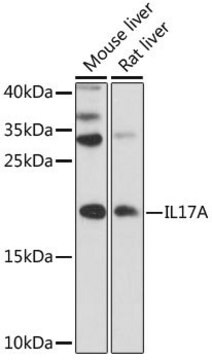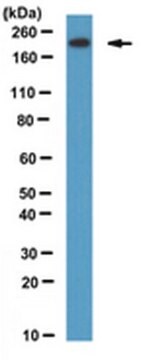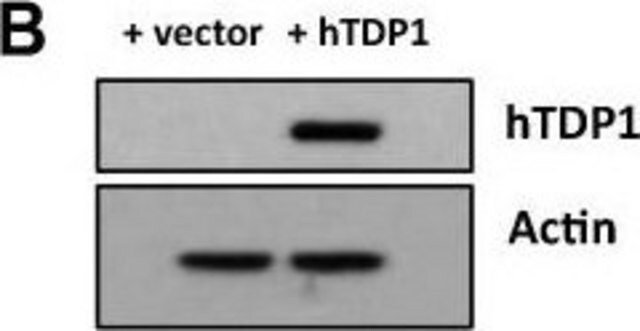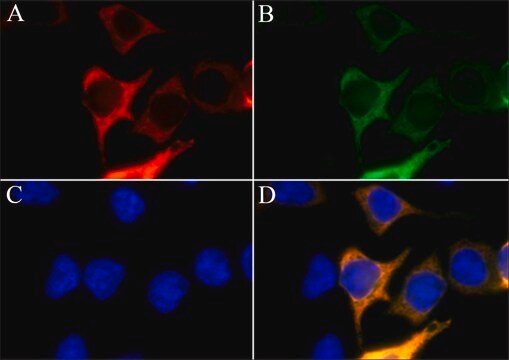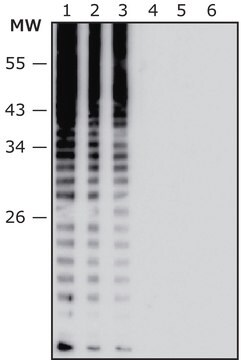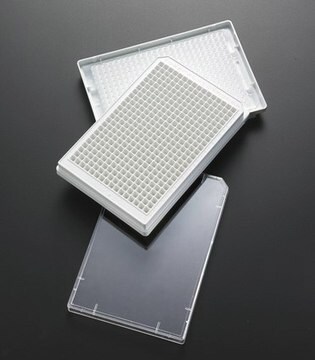MABS274
Anti-LRP6, clone A59, Ectodomain Antibody
clone A59, from mouse
別名:
Low-density lipoprotein receptor-related protein 6, LRP-6
ログイン組織・契約価格を表示する
すべての画像(1)
About This Item
UNSPSCコード:
12352203
eCl@ss:
32160702
NACRES:
NA.41
クローン:
A59, monoclonal
application:
FACS
ICC
IP
ICC
IP
化学種の反応性:
human
テクニック:
flow cytometry: suitable
immunocytochemistry: suitable
immunoprecipitation (IP): suitable
immunocytochemistry: suitable
immunoprecipitation (IP): suitable
citations:
1
おすすめの製品
由来生物
mouse
品質水準
抗体製品の状態
purified immunoglobulin
抗体製品タイプ
primary antibodies
クローン
A59, monoclonal
化学種の反応性
human
テクニック
flow cytometry: suitable
immunocytochemistry: suitable
immunoprecipitation (IP): suitable
アイソタイプ
IgG1κ
NCBIアクセッション番号
UniProtアクセッション番号
輸送温度
wet ice
ターゲットの翻訳後修飾
unmodified
遺伝子情報
human ... LRP6(4040)
詳細
Low density lipoprotein receptor-related protein 6, also known as LRP6, is a member of the low density Lipoprotein receptor gene family (LDLR). LDLR are cell surface proteins. LRP6 plays a crucial role in embryonic development by functioning as a co-receptor for the Wnt signaling pathway. LRP6 is highly homologous and presents itself as a dimer in the cell membrane until it is phosphlorylated by Wnt. LRP6 has a high affinity with the Dickkopf (DKK) family of antagonists which, when bound, block Wnt. When LRP6 binds to Wnt it is phosphlorated at multiple sites, which results in Axin, a scaffolding protein, being recruited to the cell membrane and β-catenin activation. β-catenin prevents Wnt and LRP6 from binding. LRP6 is associated with autosomal dominant coronary artery disease type 2. Mutations resulting in the omission of the extracellular domain of LPR6 results in constant activity whereas carboxy intracellular domain exclusion has a negative effect, resulting in the blocking of Wnt signaling.
免疫原
Epitope: Ectodomain Domain
Purified protein corresponding to the ectodomain domain of human LRP6.
アプリケーション
Research Category
細胞シグナル伝達
細胞シグナル伝達
Research Sub Category
インスリン/エネルギーシグナル伝達
インスリン/エネルギーシグナル伝達
Flow Cytometry Analysis: A representative lot from an independent laboratory detected LRP6, Ectodomain in Chimeric LRP6 expressing 293T cells (Yasui, N., et al. (2010). J Immunol Methods. 352(1-2):153-160.).
Immunoprecipitation Analysis: A representative lot from an independent laboratory immunoprecipitated LRP6, Ectodomain from Wnt3a-treated HEK293T cell lysate (Yasui, N., et al. (2010). J Immunol Methods. 352(1-2):153-160.).
Immunocytochemistry Analysis: A representative lot from an independent laboratory detected LRP6, Ectodomain in HeLa S3 cells (Yasui, N., et al. (2010). J Immunol Methods. 352(1-2):153-160.).
Immunoprecipitation Analysis: A representative lot from an independent laboratory immunoprecipitated LRP6, Ectodomain from Wnt3a-treated HEK293T cell lysate (Yasui, N., et al. (2010). J Immunol Methods. 352(1-2):153-160.).
Immunocytochemistry Analysis: A representative lot from an independent laboratory detected LRP6, Ectodomain in HeLa S3 cells (Yasui, N., et al. (2010). J Immunol Methods. 352(1-2):153-160.).
This Anti-LRP6 antibody, clone A59, Ectodomain is validated for use in flow cytometry, IP & ICC for the detection of LRP6.
品質
Evaluated by Flow Cytometry in HEK293 cells.
Flow Cytometry Analysis: 2 µg of this antibody detected LRP6, Ectodomain in 1X10E6 HEK293 cells.
Flow Cytometry Analysis: 2 µg of this antibody detected LRP6, Ectodomain in 1X10E6 HEK293 cells.
ターゲットの説明
180 kDa calculated
物理的形状
Protein G Purified
Format: Purified
Purified mouse monoclonal IgG1κ in buffer containing 0.1 M Tris-Glycine (pH 7.4), 150 mM NaCl with 0.05% sodium azide.
保管および安定性
Stable for 1 year at 2-8°C from date of receipt.
その他情報
Concentration: Please refer to the Certificate of Analysis for the lot-specific concentration.
免責事項
Unless otherwise stated in our catalog or other company documentation accompanying the product(s), our products are intended for research use only and are not to be used for any other purpose, which includes but is not limited to, unauthorized commercial uses, in vitro diagnostic uses, ex vivo or in vivo therapeutic uses or any type of consumption or application to humans or animals.
適切な製品が見つかりませんか。
製品選択ツール.をお試しください
保管分類コード
12 - Non Combustible Liquids
WGK
WGK 1
引火点(°F)
Not applicable
引火点(℃)
Not applicable
適用法令
試験研究用途を考慮した関連法令を主に挙げております。化学物質以外については、一部の情報のみ提供しています。 製品を安全かつ合法的に使用することは、使用者の義務です。最新情報により修正される場合があります。WEBの反映には時間を要することがあるため、適宜SDSをご参照ください。
Jan Code
MABS274:
試験成績書(COA)
製品のロット番号・バッチ番号を入力して、試験成績書(COA) を検索できます。ロット番号・バッチ番号は、製品ラベルに「Lot」または「Batch」に続いて記載されています。
Bhaven B Patel et al.
PloS one, 14(1), e0198463-e0198463 (2019-01-30)
The systematic identification of regulatory elements that control gene expression remains a challenge. Genetic screens that use untargeted mutagenesis have the potential to identify protein-coding genes, non-coding RNAs and regulatory elements, but their analysis has mainly focused on identifying the
ライフサイエンス、有機合成、材料科学、クロマトグラフィー、分析など、あらゆる分野の研究に経験のあるメンバーがおります。.
製品に関するお問い合わせはこちら(テクニカルサービス)